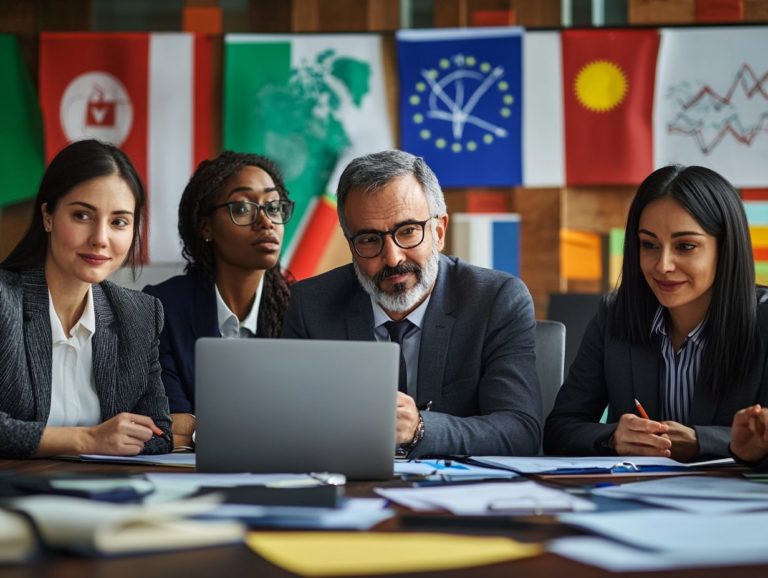How to Protect Your IP Internationally
In today’s global marketplace, safeguarding your intellectual property (IP) has never been more vital. As you expand your business beyond borders, grasping the details of IP protection becomes essential.
This article delves into the various types of IP covering everything from patents and trademarks to copyrights and trade secrets. It examines international laws, effective strategies for protecting your creations, and ways to enforce your rights.
Whether you’re a startup or a well-established company, these insights will empower you to navigate the complexities of international IP protection with confidence.
Contents
- Key Takeaways:
- Understanding Intellectual Property (IP)
- Types of IP Protection
- International IP Laws and Regulations
- Strategies for Protecting Your IP Internationally
- Enforcing Your IP Rights
- Legal Options for IP Infringement
- Tips for Maintaining International IP Protection
- Best Practices for Protecting Your IP in the Long Term
- Frequently Asked Questions
- 1. What is Intellectual Property (IP)?
- 2. Why is it important to protect your IP internationally?
- 3. What are the different ways to protect your IP internationally?
- 4. How do you register your IP internationally?
- 5. What are the potential challenges of protecting your IP internationally?
- 6. How can you ensure the protection and enforcement of your IP internationally?
Key Takeaways:

- Understand the importance of intellectual property and its impact on global business.
- Protect your IP globally by registering trademarks and patents.
- Act now to enforce your IP rights and protect your business!
Understanding Intellectual Property (IP)
Understanding Intellectual Property (IP) is essential for you, whether you re an individual or part of a business, especially if you want to protect your innovations, artistic creations, and brand identity in a competitive marketplace.
IP includes various forms of protection patents, trademarks, copyrights, and trade secrets each enhancing the commercial value and creativity of your products and services.
In a landscape where original ideas are vital, having a solid legal strategy can offer you a considerable advantage against the risks of infringement. You must navigate the complexities of IP protection effectively.
Understanding IP gives you a major advantage in the market.
Defining IP and Its Importance
Intellectual property (IP) encompasses the legal rights granted to you over your creations and innovations, playing an essential role in encouraging creativity and helping the economy grow.
By protecting your inventions, artistic works, and branding elements, these rights enable you to enjoy the benefits of your investment in time and resources. This not only encourages further innovation but also elevates the commercial value of your products and services.
Navigating the complexities of IP protection requires effective management through a solid legal strategy. This enables you to defend against infringements and leverage your assets strategically to drive your profitability and growth.
Types of IP Protection
You ll encounter several types of intellectual property protection, each meticulously crafted to shield distinct facets of creativity and innovation.
These include patents, trademarks, copyrights, and trade secrets. Grasping the nuances of these protections is crucial for individuals and businesses alike, enabling you to adeptly navigate your IP portfolio and capitalize on licensing agreements for optimal financial advantage.
Patents, Trademarks, Copyrights, and Trade Secrets
Patents protect your inventions and innovations, trademarks safeguard your branding elements, copyrights ensure protection for your artistic creations, and trade secrets are strategies or formulas that give your business an edge over competitors.
Each type of intellectual property is vital in the competitive landscape, offering different durations of protection and legal implications that can greatly influence your business strategies.
For example, patents typically grant exclusive rights for 20 years, allowing you to capitalize on your creations without the threat of competition. In contrast, trademarks can last indefinitely, provided you actively use and defend them. Copyrights generally endure for the life of the creator plus several decades, offering ample time for artists and authors like you to monetize your work. Meanwhile, trade secrets remain protected as long as you keep them confidential, highlighting the need for robust security measures.
Given these complexities, it s essential for you to develop a comprehensive legal strategy not only to protect your assets but also to navigate potential infringements and comply with relevant laws. This proactive approach helps ensure you safeguard your market position effectively.
Don’t wait! Start building your IP strategy today to secure your creative assets and ensure your business thrives.
International IP Laws and Regulations

International intellectual property laws and regulations are crucial. They help individuals and businesses safeguard their innovations and brand identity across borders.
Frameworks such as the Madrid Protocol, along with guidance from the World Intellectual Property Organization (WIPO), are instrumental in navigating this complex landscape.
Key Considerations for International Protection
When seeking international protection for your intellectual property, keep several key considerations in mind. It’s crucial to understand how to protect your IP in emerging markets, engage with legal experts, and set up a monitoring system to catch any infringement risks.
Intellectual property laws can vary significantly by country. Understanding local regulations is vital, especially when it comes to how to protect your trade secrets. Collaborating with knowledgeable legal professionals who specialize in relevant jurisdictions can greatly enhance your protection strategy.
Proactive monitoring plays a pivotal role in this process. It allows you to quickly identify any unauthorized use or infringement of your IP rights. Utilizing technology and local resources helps track potential violations, ensuring a swift response that safeguards your valuable assets in an increasingly competitive global market.
Strategies for Protecting Your IP Internationally
Developing effective strategies to protect your intellectual property globally requires establishing robust legal frameworks. For a comprehensive understanding, consider navigating international IP strategies. Foster strong relationships with international partners and leverage tools like licensing agreements and non-disclosure agreements.
These steps are essential for safeguarding your innovations and trade secrets against infringement and misuse.
Steps to Take Before Going Global
Before taking your products and services global, craft a comprehensive legal strategy. This means diving into market surveillance and building relationships with trustworthy international partners.
You must first grasp the diverse legal landscapes in different countries. This requires a detailed analysis of intellectual property laws to ensure necessary protections are in place for your innovations.
Consulting with experts can help you navigate complex regulations and potential trade barriers, offering invaluable insights.
Evaluate market trends and consumer behavior in your targeted regions. Tailor your approach effectively to comply with local laws and connect with your audience.
Act now! Proactive measures like trademark registrations and patent filings are essential to protect your brand and seize opportunities on the global stage.
Working with International Partners and Legal Counsel
Collaborating with international partners and legal experts is crucial for effectively managing your intellectual property. This ensures that your licensing agreements protect trade secrets and comply with local regulations, highlighting the importance of IP in international business.
This strategy helps you navigate the intricate complexities of various jurisdictions while fostering a robust framework for sustainable growth.
Engaging with legal counsel who understand the nuances of international law allows you to tailor your strategies to mitigate risks linked to cross-border transactions.
Establishing clear contractual obligations with your partners builds mutual trust while safeguarding sensitive information. Consider factors like jurisdictional nuances and enforcement mechanisms, as these elements can significantly influence the stability of your agreements.
Enforcing Your IP Rights

Enforcing your intellectual property rights is essential for preserving the value of your innovations and creations.
It requires a solid understanding of the legal options at your disposal to tackle IP infringement. Also, recognize the importance of holding registration certificates.
Legal Options for IP Infringement
When you encounter IP infringement, you have several legal options. You can pursue litigation, seek injunctions, or file complaints with the appropriate authorities, like the USPTO for patents or the copyright office for copyrights.
Each of these options carries its own unique processes and potential outcomes. These can significantly influence your rights and financial interests.
For example, litigation entails a formal court process where you present evidence. The final decision is left in the hands of a judge or jury.
This path could result in substantial monetary damages or injunctions against further infringement.
Seeking an injunction can grant you immediate relief by halting the infringing party’s actions while the case is being resolved.
Filing a complaint with institutions like the USPTO or copyright office can lead to administrative reviews. This often encourages negotiations or settlements outside of court.
Knowing your options empowers you to protect your intellectual property rights effectively. Don t wait act now to secure what you’ve created!
Tips for Maintaining International IP Protection
Maintaining international IP protection demands your commitment to best practices. Regular market surveillance, updating your legal strategy, and navigating IP law across borders to ensure compliance with local laws and regulations are vital.
This ongoing effort should include staying informed about any shifts in international treaties and conventions that may impact your IP rights.
Engaging with local legal experts can be particularly beneficial. They help you navigate the complexities across various jurisdictions.
By integrating regular audits of your existing IP assets and their usage, you can identify potential vulnerabilities before they become significant issues.
Utilizing technology to monitor digital markets enhances your ability to swiftly detect any infringements.
Continuous education on IP trends and fostering a culture of awareness within your organization are vital steps in creating a robust framework for sustained IP protection on a global scale.
Best Practices for Protecting Your IP in the Long Term
Implementing best practices to protect your intellectual property in the long term requires a proactive legal strategy. Safeguarding trade secrets and conducting regular market surveillance to identify potential infringement risks is crucial.
Establishing a comprehensive IP management plan is essential. It not only helps you recognize valuable assets but also ensures their appropriate registration and enforcement.
For example, securing trademarks prevents unauthorized use of your brand names. Patents grant you exclusive rights to your innovations.
Regular training for employees on IP policies further strengthens these efforts. This cultivates a culture of awareness and responsibility.
Utilizing technology to monitor the online use of your intellectual property can also serve as an effective deterrent against infringement. It enables you to take swift action when necessary.
Frequently Asked Questions
1. What is Intellectual Property (IP)?

Intellectual Property (IP) refers to the creations of the mind, such as inventions, literary and artistic works, designs, symbols, and names used in commerce. It is protected by law and can be bought, sold, and licensed, just like physical property.
2. Why is it important to protect your IP internationally?
Protecting your IP internationally allows you to safeguard your rights and prevent others from using or profiting from your creations without permission. For more information on this topic, check out how to protect your IP internationally. It also enables you to expand your business globally and maintain a competitive advantage in the global market.
3. What are the different ways to protect your IP internationally?
There are four main ways to protect your IP internationally: patents, trademarks, copyrights, and trade secrets. Patents protect inventions, while trademarks protect names and symbols used in commerce. Copyrights safeguard literary and artistic works, and trade secrets protect confidential information.
4. How do you register your IP internationally?
To register your IP internationally, you can file for protection in each country individually or use international agreements such as the Patent Cooperation Treaty (PCT), Madrid System for the International Registration of Marks, and how to protect your IP internationally through the Berne Convention for the Protection of Literary and Artistic Works.
IP protection is crucial for maintaining your rights and fostering innovation. Stay informed and proactive in your efforts to secure your creations!
5. What are the potential challenges of protecting your IP internationally?
Protecting your intellectual property (IP) internationally can be complicated and costly. To navigate this complexity, it’s crucial to understand how to protect your IP rights during litigation, as each country has different laws, making it hard to get complete protection.
Enforcing your rights in another country can also be a challenge. This process can take time and money.
6. How can you ensure the protection and enforcement of your IP internationally?
Work with experienced lawyers who specialize in intellectual property. They understand international laws and can guide you through the process.
These experts can help you tackle issues and protect your rights effectively.





